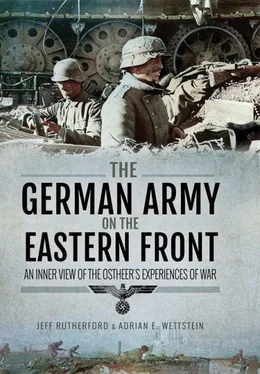Many of the issues discussed above can be seen in the following account of Oberst Richard Wolf, CO of Infantry Regiment 208, 79th Infantry Division, describing the first attack of that regiment on the Red October complex in Stalingrad, including loss of control by the higher command levels, problems in coordinating the different arms, or delays in tactical communication:
Then [1.30pm] the well-known crisis of the attack occurred. No message at all came from the front. […] One heard only sporadic small arms fire and the detonation of hand grenades and satchel charges from the attack area. […] All communication lines to the front were broken. All wires were shot up. An elimination of the jamming was nearly impossible. Both radio lines failed. The ultra-high frequency radio was still working, but the station received no new messages. Only by going through significant trouble was it possible to communicate by messengers after hours. […] These were anxious hours for the command. The higher levels of command demanded new situation reports nearly every half an hour. The liaison officers of the heavy weapons asked for new missions. Minutes passed incredibly slowly, they became torturous hours. It was not easy to stay calm. […] Then, around 4pm, came the liberating message [that the Volga was reached].
A clear mission, independent action, and initiative should allow frontline units to act even without any further orders from the superior command levels to keep the attack flowing. What this meant in practice could be seen from the after-action report from 7./Infantry Regiment 211, 71st Infantry Division, as it approached Kiev from the west in August 1941. [3]It indicated how much could be achieved by educating the last soldier to maintain the initiative:
8.8.41: The night has been calm. In pouring rain at 10 o’clock we attack again after a short artillery preparation. A Russian machine gun group at the edge of the forest offered considerable resistance. A part of the company attacked that machine gun in a spirited advance. The company commander, Oberleutnant Westphal, fell at the head of the company. Obergefreiter Weber, leader of the company troop, took the command of the company on his own initiative without any specific order, and carried the attack forward and destroyed the machine gun. In this way, he created the prerequisite for the company’s further advance. The company now had the mission to comb through the very dense municipal woods of Kiev and to reach the northern edge. It encountered considerable resistance, essentially from the right flank where all contact with the 3rd battalion was lost.
The battalion’s adjutant, Leutnant Pastor, now took command of the company. During a violent surprise artillery attack, however, he found the hero’s death after only leading the company for half an hour. Again the company troop leader took command of the company on his own initiative. A fortified and occupied kolkhoz blocked the further advance of the company. Now a short halt occurred. The company had now to repel some strong counterattacks out of the open right flank. Through ruthless action, these were repelled and the kolkhoz overrun.
Now, Leutnant Lüttich took command of the company. The municipal woods were pushed through and the company went over to the defensive on the northern edge of the municipal woods.
It was by no means logical for Weber to take command, considering the presence of several higher ranking platoon and group leaders. And each platoon leader should have been as well informed on the company’s attack plan as Weber. But Weber did not hesitate and took command. What is even more striking is the fact that he did it twice that day and achieved a considerable tactical success. As Weber had already earned both Iron Crosses, he received the Knight’s Cross for that action, an award given for deeds that influenced the course of combat decisively.
As previously mentioned, there was a thin line between independent action and arbitrary acts, and this was always in discussion within the German military leadership. For example, in the winter crisis of 1941/42, Hitler and the OKH tightened the strings of command with the following order, [4]as they feared a loss of control over the local commanders in the east would cause an uncontrolled retreat.
1) The higher command institutions (OKH, army groups and armies) have to manage the leadership more tightly. The principle of just giving the mission to the subordinate authorities and giving them full freedom in the execution of the mission has led on various occasions to the fact that the execution of the ordering command institution’s intention was jeopardized and serious disadvantages arose for the overall situation. Clear, unambiguous orders must be used again. The superior commanding institution must not hesitate to intervene ruthlessly in details in order to achieve the intended purpose. It bears the responsibility for the success, it has the right to ensure the execution of its intentions also by arranging individual measures. The duty of soldierly obedience leaves no room for the sensitivities of subordinate command institutions; instead, it requires the fastest and best execution in the sense of the commander’s original order.
The struggle for balance was also discussed in combat experience reports one year into the campaign, as the following source shows: [5]
1. Leadership
1) the German principle of issuing combat missions remains. The leadership, however, must not hesitate to intervene ruthlessly by order, if the nature of the execution endangers the fulfilment of the mission.
2) Particular care must be taken by the leadership to keep the troops in a tight grip when deployed in large areas, particularly during movement. Flexible leadership with short radio orders is particularly important.
On lower levels, especially with the panzer troops, there had been previous clashes over freedom of action, as the following order by the commander of IIIrd Motorized Corps indicates:
The events of recent days with their changing situations have placed very high demands on the physical capabilities of troops as well as on the flexibility of the leadership at all levels.
The troops should be persuaded that they will be ordered as little as possible by IIIrd Corps Headquarters; as mobile troops of a fast unit, they need to be clear about this. With such units and in vast areas with uncovered flanks, the situation frequently changes in the course of a day, sometimes from the ground up, and therefore new orders must be issued when opportunities would otherwise be missed and one would then have to pay with blood when it is cheaper to pay with sweat — or when the previous mission has become completely pointless. As long as the enemy still has his own will, not everything will work as scheduled. […]
Grumbling is psychological digestion and among us soldiers, no one finds it a problem. One can also rant freely and straight from the heart about frequent and changing orders that possibly bring the troops to the boundaries of their capabilities, or a demanded arduous counter-march, as long as one is clear that the justification of a new order can only be overseen by the commanding superior himself, not the subordinate who received it, who can only be aware of his limited sector. The subordinate must not lose sight of the fact that his superior is also a subordinate, who must cope with a new order and follow it.
All officers must be or become clear that the command of fast units demands a completely different tempo of command from infantry units.
While clearly pointing out that the extremely fluid combat situation of mobile units made independent command necessary, the commander also stressed the necessity for obedience from the point when orders were given. Together with the next source, this document also indicates that room for independent action was a question of the combat situation. Mobile warfare, especially by fast units at high tempo and over long distances, created many more situations for independent action than positional warfare. Therefore the switch from one form of the combat to the other demanded a rethinking of the balance between tight command and initiative, but also of the command process as a whole, as the following order by Fourth Army from January 1942 indicates: [6]
Читать дальше






![John Stieber - Against the Odds - Survival on the Russian Front 1944-1945 [2nd Edition]](/books/405234/john-stieber-against-the-odds-survival-on-the-russian-front-1944-1945-2nd-edition-thumb.webp)





